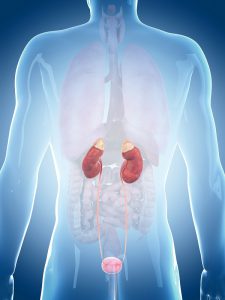
 Pyelonephritis is a urinary tract bacterial infection that causes inflammation of the kidneys. Acute Pyelonephritis is severe and sudden whereas persistent or recurrent infection results in chronic Pyelonephritis. The condition can be life-threatening. Read further to find out more about urinary tract infection symptoms, treatment.
Pyelonephritis is a urinary tract bacterial infection that causes inflammation of the kidneys. Acute Pyelonephritis is severe and sudden whereas persistent or recurrent infection results in chronic Pyelonephritis. The condition can be life-threatening. Read further to find out more about urinary tract infection symptoms, treatment.
Urinary tract infection Causes:
Gram-negative bacteria like Escherichia coli, Enterobacter, Proteus, and Klebsiella cause acute pyelonephritis. Most commonly the infection occurs when the bacteria first attaches to the urethral mucosal epithelial cells and then travels up the bladder via the urethra. This happens either through instrumentation or urinary tract infections. It occurs most commonly in women due to hormonal changes, close distance between urethra and anus, as well as the shorter urethra in women as compared to men. Urinary tract infection can also occur due to hematogenous spread. An obstruction to urine flow by kidney stone can result from incomplete urine emptying and multiplying of bacteria; thereby, causing acute Pyelonephritis. Vesicoureteral reflux, a congenital disease that causes urine backflow into kidneys also leads to pyelonephritis.
Diagnosis:
1. Through Urine Testing:
The most common method for detecting a kidney infection is through a urine test. Urinary tract infection symptoms such as fever, pus or blood in the urine, cloudy urine, frequent urination, or fishy-smelling urine are common grounds for undergoing a urine test.
2. Through Imaging Tests:
Doctors recommend ultrasound tests to look for urinary obstructions like cysts, tumors, or kidney stones. If the patient remains unresponsive to treatment within 72 hours then CT scans are carried out.
3. Through Radioactive Imaging:
A health professional performs a DMSA (dimercaptosuccinic acid) test to detect scarring in the kidneys. Radioactive material is injected into the arms intravenously and it detects the scarred areas.
Treatment:
1. Administration of Antibiotics:
The choice of antibiotics depends on the identification of bacteria. Usually, doctors recommend a broad-spectrum antibiotic for treatment, like Ampicillin, Ciprofloxacin, or Levofloxacin.
2. Medical Guidance:
In severe cases, patients may require hospitalization. Intravenous hydration and antibiotics is administered for 24-48 hours depending on the severity and response from patients. Doctors may also monitor the blood and urine levels of the patients.
3. Surgery:
Recurrent urinary tract infection treatment requires surgery to remove the obstruction or correcting structural problems in the kidneys. An abscess is also addressed through surgery if antibiotics don’t work.